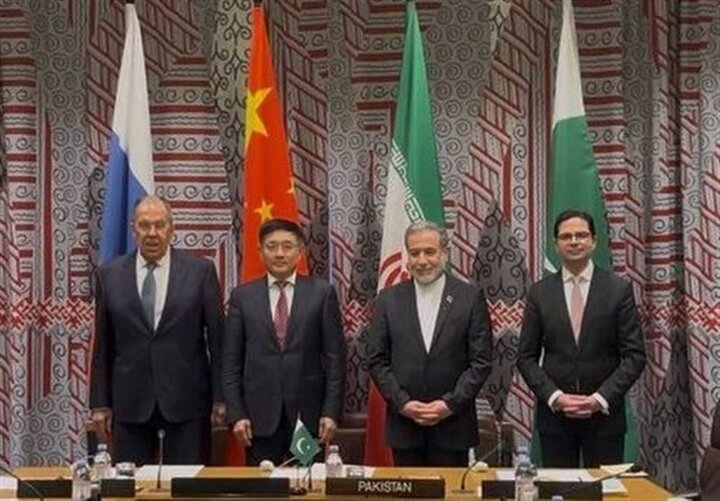WNAM REPORT: The foreign ministers of the People’s Republic of China, the Islamic Republic of Iran, the Islamic Republic of Pakistan, and the Russian Federation issued a joint statement over Afghanistan on Thursday.
At the invitation of the Russian Federation, the foreign ministers of the People’s Republic of China, the Islamic Republic of Iran, the Islamic Republic of Pakistan, and the Russian Federation convened their fourth quadrilateral meeting on Afghanistan on Thursday, September 24, on the sidelines of the 80th session of the United Nations General Assembly in New York.
The four ministers discussed the latest developments in Afghanistan and issued a joint statement, in which they:
- Reaffirmed their support for Afghanistan as an independent, united, and stable country free from terrorism, war, and narcotics.
- Backed effective regional initiatives aimed at strengthening Afghanistan’s economy and underlined the importance of sustained economic engagement to improve the dire humanitarian situation. They expressed readiness to expand economic and trade cooperation and regional connectivity with Afghanistan, facilitating its active integration into regional economic frameworks.
- Recognized the importance of easing the 1988 sanctions regime in light of realities on the ground, in order to promote peace and stability. They called for avoiding politicization and double standards, particularly on travel-ban exemption requests for Taliban-listed individuals, which they deemed vital to advancing an inclusive approach.
- Emphasized the importance of continued humanitarian assistance and urged the international community to provide more emergency aid to the Afghan people. They stressed that humanitarian support must be delivered free from political considerations.
- Expressed deep concern over the security situation stemming from terrorism in Afghanistan, noting that groups such as Daesh, al-Qaeda, the East Turkestan Islamic Movement (ETIM), Tehrik-i-Taliban Pakistan (TTP), Jaish al-Adl, the Balochistan Liberation Army (BLA), the Majeed Brigade, and others operating on Afghan soil continue to pose serious threats to regional and global security
- Commended Afghan efforts to reduce traditional opium cultivation and, given the sharp rise in synthetic drug production, including methamphetamine, urged comprehensive counter-narcotics measures. They stressed the need to jointly dismantle transnational organized criminal networks involved in drug trafficking and cut off trade and transit routes, while underscoring the importance of international support for promoting alternative livelihoods and agriculture to build a drug-free society.
- Called on Afghan authorities to facilitate the safe return of refugees and prevent further mass migration, while ensuring the livelihoods and social integration of returnees. They expressed appreciation to Iran and Pakistan for hosting millions of Afghan refugees and urged the international community and donors to provide predictable and sustainable financial and technical support to both the refugees’ return and the host countries, in line with international responsibility-sharing.
- Stressed the importance of establishing an inclusive system of governance in Afghanistan that reflects the interests and aspirations of all segments of Afghan society.
- Highlighted the rights and needs of all Afghan citizens, including ethnic and religious groups. They underlined that ensuring women’s and girls’ access to education, employment, economic opportunities, freedom of movement, justice, and basic services would contribute to Afghanistan’s peace, stability, and prosperity.
- Held NATO members accountable for Afghanistan’s current situation and called on them to create opportunities for the country’s economic recovery and development. They demanded the immediate lifting of unilateral sanctions, the release of Afghanistan’s frozen assets, and opposed any redeployment of foreign military bases inside or around Afghanistan, describing such moves as detrimental to regional peace and security.
- Voiced support for all diplomatic efforts aimed at a political settlement of the Afghan issue and expressed readiness to cooperate with the international community, particularly the United Nations, in this regard. They emphasized the important role of regional platforms such as the Moscow Format, the Foreign Ministers’ Meeting of Afghanistan’s Neighboring Countries, and the Shanghai Cooperation Organization in facilitating a positive political outcome.


